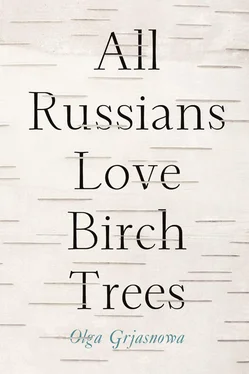“My apartment in the States is empty. My sister is sleeping in my old childhood room. I’m neither here nor there. If I knew at least how long I have to stay, I would get a room. Do something. Not vegetate in constant transit.”
“And during the day? What do you do then?”
“I try to make progress on my research. But that’s ridiculous. In the morning I go to the library and read. But by noon I’m tired already. I’m always tired, but I stay in the library, not wanting to go home. Most of all I don’t want Minna to see me like this.” He paused, emptied his glass in one gulp, and ordered a new one. “She asks about you all the time.”
Our feet touched under the table. The English conversation grew louder, but I couldn’t discern distinct words from the babble of voices. They played a drinking game and sang a song. The waitress brought them round after round of shots.
I looked at Sami, felt a warmth inside me and a longing for Elias. His touch, his bad mood, his smell.
“I don’t want to get home too late,” I said. Sami nodded and signaled the waitress.
The night was starlit. In silence we walked to the tram stop. I shivered. Sami waited with me for my tram, which I interpreted as a fond gesture. When the tram pulled up he gave me a kiss on the cheek and waited until I’d made it through the doors. A light rain set in.
It was already dark in the apartment, although it wasn’t even eleven. Rain dripped from my umbrella onto the linoleum floor and — good girl that I was — I opened it and set it down to dry. The distant rumble of the tram and the weak glow of streetlamps trickled into our apartment from outside. I opened the fridge. The upper shelf was full of Elias’s film. I angled in the freezer for the vodka bottle and poured myself a glass. All without turning on the light. The alcohol burned in my throat and warmed me. Then I quickly took off all my clothes and stepped into the shower. It took a little while to wash away the smell of the bar and the thoughts of Sami.
Elias lay on my side of the bed, the cover pulled over his face. I inched my way forward. He took me into his arms and gave me a strong hug, and I hugged him back just as strongly. Affirming for him and for me. We stayed like that, breathing in the breath of the other, and didn’t dare to move.
“What time is it?” Elias murmured.
“Eleven.”
“Good. You came home early.” He fell asleep. I lay next to him, awake, and was suddenly afraid, but didn’t know of what.
In the morning we made love to the sound of yelling drunkards, ignoring their screams with aristocratic calm. Afterward we lay next to each other for a long time. Elias stroked my hip and kissed my back until he sat up and said, “I’ve lost a lot of weight, haven’t I?”
I also sat up and took him in.
“It’s because I only lie down these days.” He quietly added, “All my muscles are gone.”
I placed my right palm on his face, kissed the tip of his nose, and said, “They’ll come back. Everything is going to be fine.” And because he looked at me skeptically I added, “I promise.”
He smiled and I suggested, “I’ll make us breakfast, OK?”
“We’ve got to do something to put some meat back on my bones, right?”
“Exactly. Because I never ever want to go back to that hospital,” I said.
Elias started asking his questions again. We lay in bed, body to body. The rain pounded against the window. We’d just had our first nice evening together in ages. No fighting, just pizza and a movie, without any trace of anger.
We fought over every little thing. He didn’t recover, the pain was bad, and he could hardly move. For the first few weeks after the surgery he couldn’t put his full weight on his leg, which meant he couldn’t get up without help. I went to the supermarket, to the bakery, to the dry cleaner. I hung laundry, washed dishes, vacuumed, cooked, went to the library. In the evening I felt drained, fell into bed, and went to sleep right away. Elias would lie awake next to me for a long time, only beginning to drift off with the first rays of morning light. He didn’t like my cooking, pushed food around his plate, didn’t eat. An hour later, he would put a pot of milk on the stove. And then, with a grave expression, he would dip Nutella sandwiches into the pot. I didn’t say anything, but treated him coolly. I knew that it was childish, but I was overworked and overwrought. Elias increasingly accused me of being distant.
But despite our tense mood, we mostly managed to hold back. Sometimes he did well and then friends would come over to watch movies and drink beer. But those days were rare.
“What happened back then in Baku?” He posed the question quickly and out of the blue.
I held my breath, thought for a while, then said, “I’ve told you already.”
Elias struggled to sit up.
“You have to start trusting me,” he said.
“It’s not about that.” My voice sounded harsh.
“What’s it about then?”
I sat up too, and turned on the bedside light.
“What’s up with your father?” I asked.
His expression became even more tense.
“What do you mean?” he asked hesitantly.
“Did he ever beat you?”
Elias stared at me, shocked by the turn our conversation had just taken. “What do you mean?” he asked again.
“When he was drunk, did he beat you?” My voice broke. Remorse crept in.
“Sometimes he drank for days on end, and then for months he didn’t touch a sip. It was a toss-up. I never knew what state he would be in. Mostly he drank at night, when my mother was at work. I brought him to bed and cleared away the bottles and vomit before my mother came home in the morning.
“She left you alone with him?”
“What choice did she have? She worked, put up with his moods and self-importance without saying a word. Right after the Wall came down he lost his job. But he’d started drinking long before that. Well, what do I know?” Elias fell silent. I waited, although I knew that he wouldn’t say anything more. But after a while he continued and I asked myself what I knew about Elias and if I really knew him at all.
“On the days when he couldn’t speak in coherent sentences anymore, I would sometimes take pictures of him. One day he found the box with the photographs.”
“And then?”
Elias turned off the light and buried his face in the cushion. I reached underneath his T-shirt and stroked his back and covered his neck with kisses. But he didn’t move. Still, in the following days Elias would tell me even more. It was as if a dam had burst inside him.
When I was a child I often went for walks to the park with my mother. In the afternoon, and sometimes in the mornings, too. In the park there were rides, katcheli , that were all broken. Or they lacked the electricity to get them going. Mother often told me scary stories about the Katchelchik .
My favorite game at the time was News, and it went sort of like this: Divide up the park and try to take over the others’ territories. By any means necessary. Just like on the news that aired on TV after the cartoons. We played National Front. We played war.
I don’t remember his name, but the boy had red hair. Even his feet and knees were covered in freckles. He was my enemy. My personal Nagorno-Karabakh. We fought. One of us always cried. Which probably was because we battered each other with sticks and stones. And then the boy entrenched himself in a tree. It was a large, beautiful tree at the edge of the park, far away from our mothers. From a high branch he threw stones and nails, and when I’d almost conquered the tree — just as the Armenian forces had done with Shusha — our mothers decided we should reconcile. The redheaded boy’s father was the chief of police and had excellent access to the black market. The enemy’s mother was a small woman with long red hair. In the park she always bragged about marital love — every day her husband returned home during his lunch break to make fervent love to her. She confuses sex with love, I heard my mother say — not without a trace of jealousy in her voice.
Читать дальше












